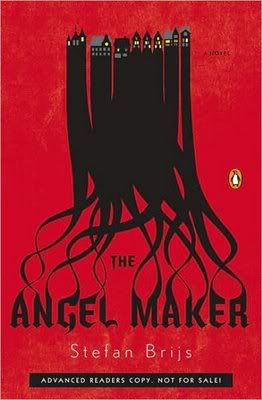I was originally planning to do a fairly academic, drawn out post here about how Neil Stephenson's Snow Crash is not actually cyberpunk, but my smarter-than-me boyfriend has informed me that, in fact, it's categorized as "post-cyberpunk" and not actually the former at all. So. That happened.
(My reasoning was going to be an elegant deconstruction about how the focus of Snow Crash is actually the relationships between people, rather than mankind's relationship to technology and machines, which is what I think the point of pure cyberpunk is. Snow Crash is much more involved in tracing the connecting lines between people, following threads of religion, language, and conformity to show the web that's netting all of us into one big mass of humanity. And then that humanity breeds viruses and programs, I don't know. I stopped outlining what was essentially a college essay when I discovered that this is not a new theory.)
I could ALSO give my excuses for not reading One Hundred Years of Solitude yet, but that one boils down easy: the guy in my office who told me I have to read it, said I need to watch some bizarre film called Gummo first. I haven't watched the film yet, so I haven't read the book yet. I'm going to begin it tentatively, I can tell you that much - I'm no longer intimidated by not finishing books, so if it drags too hard I'm putting it down. But I'm probably being unfair to it; Lord knows that since finishing school I've gotten HELLA lazy in my reading habits.
What I will do is cheerfully tell you to go read The Girl With The Dragon Tattoo, and its sequel, The Girl Who Played With Fire. Wonderful character-driven mysteries, and Larsson the author is a master of story-telling. The fact that they are both translations (Swedish to English) didn't actually impact the prose for me, either (I tend to think translations come out a little stiff, but Tattoo and Fire are both fluid and charming).
Showing posts with label translation. Show all posts
Showing posts with label translation. Show all posts
Monday, January 18, 2010
Sunday, June 7, 2009
The Angel Maker

I was quite excited when I picked up The Angel Maker, by Stefan Brijs, from a discount bookstore. The back promised me an eerie, probably viscerally disgusting medical horror, combining science, religion, and playing God in a way that seemed vastly more interesting than Frankenstein ever was. A Belgian novel by origin, The Angel Maker begins promisingly with the introduction of Doctor Victor Hoppe and his three identical, disfigured sons to a small village in Belgium called Wolfheim, and unwinds slowly into a nest of medical ethics versus progress, theological reasoning, and the power of people to rationalize the things that they don't understand.
The Angel Maker suffers from several things, first and foremost from a title that is far too heavy-handed. Much of what seems intended to be later revelations on behalf of the reader are too easily derived from the title and the names of the children, making the moments of what should be understanding towards Dr. Hoppe fall disappointingly flat. The brief on the back of my copy was also insufferably misleading, as this novel is not really about the Frankenstien-ian themes of creating life; it seems intended to show where science and religion cannot cross, taking the ethics of the situation for granted.
The novel also struggles with story-telling, as though Brijs did not have a clear understanding of how he wanted to put the story together. It is divided into three sections, and the first leads off very strongly. The second third is meant to comprise the backdrop to Dr. Hoppe's experiments in Wolfheim, and bounces between his awful childhood, his time in medical school, his previous research, and the events leading up immediately to his transfer to Wolfheim. This mosaic gets increasingly difficult to follow the longer it goes on, so that there are points when I had trouble distinguishing when I actually was in the timeline.
The third section of the novel is obviously meant to be the dramatic spiral downward for the doctor, but it comes too soon - there is not enough buildup to justify Dr. Hoppe's descent into madness. It has been clear through the whole book that he is obsessive and unbalanced, but there is no final tipping point; Brijs does not quite earn the final climactic scene, and so it becomes much less effective than it should be in favor of shock horror.
At its best, The Angel Maker is a fascinating look at genetics and scientific ethics, interspersed with occasional humanizing and touching element (the scenes of the children and their nanny-cum-teacher are poignant in a deeply satisfying way). At its worst, it takes the easy route, going for the cheap shocks and gasps and foregoing the furthering of the real issues. It is, however, intriguing, and a good read for those (like me) who can't seem to stay away from medical horror shows.
Labels:
brijs,
medical horror,
science fiction,
translation
Subscribe to:
Posts (Atom)
